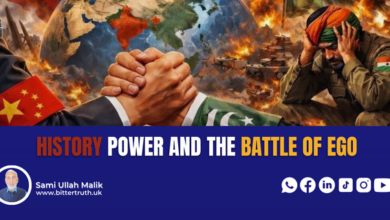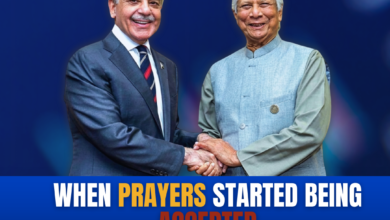Political Fate of Hasina and Imran: Trump’s Influence and Global Politics
The Interim Government of Bangladesh and Corruption
Donald Trump of the Republican Party is set to take the oath as the 47th President of the United States on 20th January 2025. While Trump has received congratulatory messages from around the world, countries in South Asia have pinned significant hopes on him. In nations like Pakistan and Bangladesh, there is an amplified narrative suggesting that the policies of the next occupant of the White House will exert such pressure on these countries that their leaders will not only be released from incarceration but also reinstated to power. The assumption is that Trump might appoint viceroys of his choice in these nations, turning them into de facto colonies of the United States.
However, while Trump’s re-election has sparked anxiety in some countries, others seem optimistic. Certain leaders of Pakistan’s PTI party believe that Trump will secure the release of their “good friend,” Imran Khan. They assert that Khan’s public declarations of independence—such as his rallying cries of “We are not slaves” and “Absolutely not!”—will be forgotten in favour of US interests under Trump’s leadership.
A similar sentiment prevails in Bangladesh, where speculations abound that the former Prime Minister, Sheikh Hasina, might regain her lost political footing with Trump’s return. Notably, in August this year, Sheikh Hasina had to flee the country amidst a student-led movement, seeking refuge under Indian Prime Minister Narendra Modi’s protection. In her absence, an interim government was established, with Nobel laureate economist Dr. Muhammad Yunus appointed as its chief adviser.
The pressing question remains: Are these expectations of Trump’s priorities grounded in reality, or are they merely statements designed to recover his party’s lost popularity and deflect attention from corruption? How will the political landscapes of Pakistan and Bangladesh be impacted by the change in leadership in Washington? Can these countries expect the same level of support under Trump’s administration as before?
On social media platform X, Sheikh Hasina shared a photograph of herself with Donald Trump, congratulating him on his victory as the 47th President of the United States. She described Trump’s electoral triumph as a testament to his leadership and the American people’s trust in him. Expressing hope for stronger bilateral relations during Trump’s second term, she emphasised collaboration to advance mutual and multilateral interests, while wishing the newly elected President and his family good health and longevity.
In 2016, Donald Trump defeated Democratic candidate Hillary Clinton to win the US presidency. At the time, Muhammad Yunus, now heading Bangladesh’s interim government, likened Trump’s victory to a solar eclipse and a dark day. Yunus criticised the 2016 elections as an example of flawed politics, advising Trump to build bridges instead of walls and adopt a more liberal approach. Many analysts perceived Yunus as being closer to the Democrats, which was evident when the Biden administration and Hillary Clinton worked closely with him during Bangladesh’s political transition.
Yunus’s recent visit to the US, particularly his participation in the Clinton Global Initiative programme alongside former US President Bill Clinton, drew considerable attention. As power shifts from Democrats to Republicans in the US, the key question is whether Trump will continue Biden-era policies in South Asia or chart a new course.
Political analysts note that the Biden administration treated Bangladesh as an independent entity, contrasting with the previous view of South Asia as a singular bloc through an Indian lens. This shift resulted in significant changes in Bangladesh, including stricter scrutiny of human rights and election-related issues under Biden’s tenure, which strained relations with Sheikh Hasina.
Kadul Kolol, political editor of Bangladesh’s Bengali-language daily Prothom Alo, highlighted that while US-Bangladesh relations were not strained during Trump’s first term, the electoral process in Bangladesh faced criticism. However, apart from calls for free and fair elections, the Trump administration refrained from taking significant action. Trade and dialogue between the two nations continued. Kolol remarked that Muhammad Yunus’s recent meeting with Joe Biden has left many speculating about what lies ahead.
NTV Bangladesh senior journalist Barshon Kabir observed that Trump’s perspective on the subcontinent is influenced by his close ties with Indian Prime Minister Narendra Modi. While Trump’s return to power has elicited mixed feelings in Bangladesh, Yunus maintains strong relations with the US. Despite this, Kabir anticipates significant changes in India’s relations with Bangladesh under Trump’s leadership.
Meanwhile, India, which once treated Bangladesh as a colony, has officially been asked to hand over the deposed Prime Minister Sheikh Hasina to Bangladesh for judicial proceedings. Bangladesh’s advisor on foreign affairs, Touhid Hussain, informed the media that the country seeks Hasina’s extradition to face charges, including the deaths of hundreds of students during the protests that led to her ouster.
India’s Ministry of External Affairs Confirms Sheikh Hasina Extradition Request
India’s Ministry of External Affairs has confirmed receiving an official diplomatic letter from Bangladesh regarding the extradition of Sheikh Hasina. However, spokesperson Randhir Jaiswal stated that, at this stage, no further comments could be made on the matter.
It should be noted that former Bangladeshi Prime Minister Sheikh Hasina arrived in Delhi on August 5, via a flight from Dhaka, following widespread protests and violent demonstrations against her government in Bangladesh. Since then, she has been residing in Delhi. Initially, reports suggested that she would leave Delhi for the United Kingdom, but for unspecified reasons, this did not happen. Sheikh Hasina and the Awami League are considered to have close ties with Delhi. Her asylum in India has incited strong resentment among the Bangladeshi public against India.
There is an extradition treaty between India and Bangladesh for criminals and wanted individuals. The Indian government anticipated that at some point, Bangladesh’s interim government would formally request Sheikh Hasina’s extradition. However, it is highly unlikely that India will hand her over to Dhaka. Bangladesh is also aware that such a request would lead to prolonged legal proceedings, potentially lasting years.
After the establishment of an interim government in Dhaka, led by Muhammad Yunus, the Indian media has portrayed this administration as a radical Islamist, anti-India, and anti-Hindu regime. Indian media outlets have frequently aired reports showing attacks on the Hindu minority community and their temples in Bangladesh. Over recent months, the Ministry of External Affairs in India has repeatedly expressed concerns over attacks on Bangladeshi Hindus and their places of worship.
Recently, tensions between the two nations seemed to escalate further when a controversial Facebook post by Muhammad Yunus’s adviser, Mahfuz Alam, depicted Indian territories such as Tripura, West Bengal, and Assam as part of Bangladesh.
Indian strategic affairs expert Brahma Chellaney shared a screenshot of Mahfuz Alam’s Face book post, commenting:
“During an event attended by former US President Bill Clinton, Muhammad Yunus introduced Mahfuz Alam as the mastermind behind the fall of Sheikh Hasina’s government. Now, this Islamic student leader envisions an ‘Akhand Bangladesh’ (Unified Bangladesh), which includes parts of India. Mahfuz Alam has been given a ministerial rank in Muhammad Yunus’s administration.”
Foreign affairs analyst Nainima Basu emphasises that while attacks on Hindus in Bangladesh have occurred, it is crucial to note that most Hindus in the country are Awami League supporters. Many of these attacks were targeted at pro-Awami League Hindus who had participated in violent actions against protestors during Hasina’s tenure. These incidents have also affected Muslims on a significant scale, making them political rather than religious in nature. However, the way these events were exaggerated in Indian media has undeniably strained bilateral relations.
Having recently visited Bangladesh, Nainima Basu notes that the Hindu community in the country is focused on safeguarding its democratic rights in the evolving political landscape. She argues that Bangladeshi Hindus, if given the choice, would prefer migration to the US or Europe over India, indicating no special affinity towards India.
The Extradition Debate
The question arises: have relations between India and Bangladesh deteriorated substantially following the establishment of the interim government, and will Sheikh Hasina’s extradition request further strain ties?
Analyst Nirupama Subramanian suggests the relationship between the two nations will not be significantly impacted by these developments. She explains:
“India’s Foreign Secretary Vikram Misri recently visited Dhaka, indicating Delhi’s acknowledge ment that Sheikh Hasina will not return to power in the near future. The Awami League will require significant time to regain its position as a functional and popular political entity. Therefore, India’s only pragmatic approach is to strengthen relations with the interim government.”
This is necessary not only due to the presence of a sizeable Hindu minority in Bangladesh but also because bilateral relations directly influence the security of India’s northeastern states and the increasing influence of China in the region. Misri’s visit to Dhaka represents a critical step in this direction.
Meanwhile, Indian disinformation campaigns have claimed that democracy in Bangladesh will weaken under the interim government, allowing hardline religious factions to seize power. While the interim government includes progressive members, it also comprises individuals with strong religious ideologies.
Democratic Aspirations and Future Prospects
Criticism of Sheikh Hasina’s governance has centred on allegations that elections under her regime were unfree and unfair, with opposition parties barred from participating. Nainima Basu underscores the need for early elections in Bangladesh, ensuring inclusive participation by all political groups to uphold democratic values.
Michael Kugelman, head of the South Asia Institute at the Wilson Center in Washington, commented on Bangladesh’s current political scenario in an op-ed:
“It is noteworthy that Dhaka currently lacks an elected government. However, the emergence of a new, powerful political group, committed to restoring democracy, offers hope for the future. This group includes student leaders who led protests resulting in Sheikh Hasina’s ousting and some of whom are part of the interim government. The administration features human rights advocates and reformists committed to democratic improvements.”
Bangladesh’s Interim Government and Corruption Allegations
The interim government of Bangladesh is being led by Nobel laureate Muhammad Yunus, who is considered one of the country’s foremost democracy advocates. He is held in high esteem, especially among the youth of Bangladesh. Historically, there have been several examples of resistance leaders strengthening democracy in their respective nations. Notable examples include Václav Havel of Czechoslovakia and Kim Dae-jung of South Korea. In these countries, resistance movements took power and subsequently reinforced democratic institutions. It cannot be ruled out that Yunus and the student leaders rallying around him may form their own political party to challenge the entrenched dynastic and undemocratic political leadership of Bangladesh.
Meanwhile, the name of British Minister Tulip Siddiq has surfaced in connection with ongoing corruption investigations in Bangladesh. She has been accused of her family’s alleged involvement in embezzling £3.9 billion. Tulip Siddiq, aged 42, serves as the UK’s Minister for Anti-Corruption and is the niece of former Bangladeshi Prime Minister Sheikh Hasina Wajed. She has been accused of facilitating an agreement in 2013 between Bangladesh and Russia, which allegedly inflated the cost of a nuclear power plant in Bangladesh. The new government in Bangladesh is actively investigating allegations of corruption against Sheikh Hasina and her family, and Tulip Siddiq’s name has been implicated as part of these probes. However, Siddiq has dismissed the allegations as politically motivated and aimed at undermining her aunt, Sheikh Hasina.
The UK’s Conservative Party’s Shadow Home Secretary, Matt Vickers, remarked on the matter:
“The revelation that the Labour Party’s Anti-Corruption Minister herself faces corruption allegations is yet another stain on Keir Starmer’s leadership. The British public deserves a government focused on their concerns, not one entangled in yet another corruption scandal. It is time for Tulip Siddiq to come clean.”
In Bangladesh, the Anti-Corruption Commission (ACC) is currently investigating Sheikh Hasina’s sister, Tulip Siddiq, as well as other members of the former government. Additionally, the Bangladesh International Crimes Tribunal (ICT) has issued arrest warrants against Sheikh Hasina and 45 other individuals on charges of crimes against humanity.
Interestingly, parallels can be drawn between the political trajectories of Sheikh Hasina and Pakistan’s Imran Khan. Supporters of both leaders are looking towards Donald Trump, not only for their release but also for their potential return to power. Both leaders face extensive corruption cases. The pressing question is whether their optimism regarding Trump will yield results, given America’s stance that there are no “free lunches” in global politics.
Could these leaders be leveraged as part of the Quad alliance aimed at countering China? Only time will tell whether these “optimistic hopes” will transform into bitter realities. History shows that once the United States achieves its objectives, it does not hesitate to abandon its allies. Pakistan, more than any other nation, has experienced this harsh truth.






